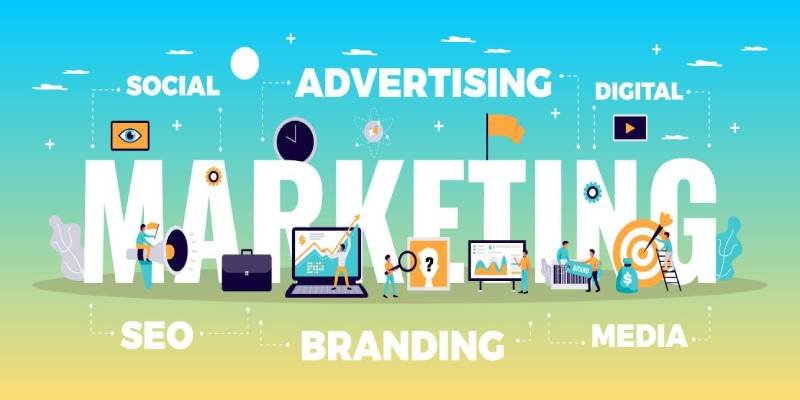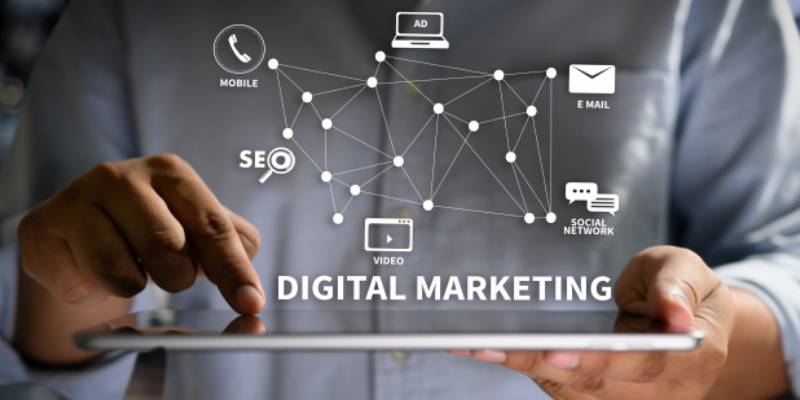One of the most often used buzzwords in marketing is Digital Marketing. Everyone is talking about digital marketing, and experts are praising it as a viable means of expanding an internet firm.
Marketing, in its broadest sense, is the process of discovering and meeting consumer demands. In the commercial world, this is a critical duty since good marketing activities may generate inbound leads and attract a big client base.
A market orientation, product mix, and business environment study are all part of the classic marketing cycle. Digital marketing is a relatively young discipline, despite its deep roots in corporate history and culture.
What is Digital Marketing
Digital marketing is a type of marketing that promotes and sells products and services through the internet. Digital marketing is also known as online marketing, internet marketing, and advertising.
Digital marketing uses electronic devices to deliver promotional material and track its effectiveness is referred to as digital marketing.
In comparison to conventional marketing, some marketing professionals believe digital marketing to be a totally new effort that requires a fresh approach to clients and a new knowledge of how customers behave.
Digital marketing, in contrast to traditional marketing, which is static and sometimes referred to as “one-way” communication, is a dynamic, ever-changing process.
Consumers cannot connect with a company through a billboard or print advertisement, but digital marketing allows for two-way contact between a company and its current or potential customers.
For many people, screen usage is at an all-time high these days. This reality is used by digital marketing, which promotes company products and services on the internet.
Businesses may increase the likelihood of their marketing efforts reaching customers by targeting them where they spend the majority of their time.
From small companies or start-ups to large enterprises, a comprehensive digital marketing strategy may provide considerable commercial rewards.
Online advertising, search engine optimization and marketing, social media marketing and management, and content production, for example, are all common components of a successful digital marketing plan.
How Does Digital Marketing work?
It’s easy to understand how digital marketing works.
To begin, you must define your digital marketing objectives, or what you hope to achieve with digital marketing. Some frequent examples include raising brand recognition, increasing sales, and expanding your community.
Then you must select which marketing channels will assist you in achieving your objectives. If you want to increase sales, for example, launching sponsored advertisements on Google and Facebook is a smart place to start.
You may establish a strategy that specifies how much money you’ll spend, your target audience, performance indicators, and other information that will assist you to control the process to make it simpler to manage.
This is the goal of a digital marketing campaign. Don’t worry if it’s still unclear; towards the conclusion of this piece, there’s a more thorough example of how to construct a successful digital marketing campaign.
Before you launch your first digital marketing campaign, you must first understand the various marketing channels and how they operate.
Channels of Digital Marketing
All digital marketing channels play a main role in the solution for a business and harmoniously play off one another. Although the most successful digital marketing channels for your business will be determined by the factors.
I discussed, here the 5 most effective digital marketing channels that are currently trending and have been shown to provide significant benefits.
Website Marketing
All digital marketing efforts revolve around a website. It’s a strong channel on its own, but it’s also the medium for a number of internet marketing efforts.
A website should clearly and concisely reflect a brand, product, or service. It must be quick, mobile-friendly, and simple to use.
Search engine optimization (SEO)
SEO is the act of optimizing your website’s content, technical setup, and reach such that your pages appear at the top of a search engine result for a specified set of keyword words is known as SEO.
When visitors show behavior indicating that they’re looking for related items, SEO can bring them to your site, which can be a game-changer considering that 90% of individuals searching haven’t formed an opinion about a brand yet.
Pay-Per-Click Advertising (PPC)
PPC advertising allows businesses to reach Internet consumers via paid advertisements across a variety of digital channels.
Marketers may create PPC campaigns on Google, Bing, Linked In, Twitter, Pinterest, or Facebook and target individuals who are looking for phrases related to their products or services.
Users can be segmented based on demographic factors (such as age or gender) or even targeted based on their specific interests or location in PPC ads. Google Ads and Facebook Ads are the most prominent PPC platforms.
Content Marketing
The objective of content marketing is to utilize content to reach out to potential consumers. Typically, content is uploaded on a website and then pushed using social media, email marketing, SEO, or even PPC advertising.
Blogs, eBooks, online courses, infographics, podcasts, and webinars are examples of content marketing tools.
Email Marketing
One of the most successful digital marketing platforms is email marketing. Many people mistakenly associate email marketing with spam email messages, but this is not the case.
Email marketing is a way to communicate with potential consumers or individuals who are interested in your business. Many digital marketers utilize all other digital marketing channels to get leads for their email lists, and then use email marketing to convert those leads into customers.
Social Media Marketing
A social media marketing campaign’s main goal is to raise brand awareness and build social trust. You may utilize social media marketing to generate leads or even as a direct sales channel as you learn more about it.
Affiliate Marketing
Affiliate marketing is one of the oldest types of advertising, and the Internet has given this old standby a new lease of life. Influencers that use affiliate marketing to promote other people’s products earn a commission every time a sale or a lead is generated.
Affiliate programs, such as those offered by Amazon, pay out millions of dollars every month to websites that sell their items.
Native Advertising
Native advertising is marketing disguised as native advertising. Its objective is to blend in with the information around it, making it less visible as advertising.
Native advertising was developed in response to today’s customers’ aversion to advertisements. Many customers will assume that an ad is biased if the creator pays for it to appear. As a result, they will disregard it.
A native ad avoids this prejudice by providing information or amusement before going into any commercial content, thereby minimizing the “ad” element.
It’s critical to carefully mark your native advertisements at all times.
Video Marketing
YouTube has overtaken Google as the second most popular search engine, with many people using it to research products, learn new skills, read reviews, or simply unwind.
To launch a video marketing campaign, you may utilize a variety of platforms, such as Facebook Videos, Instagram, or even Tiktok. Companies who use video in conjunction with SEO, content marketing, and larger social media marketing efforts have the best success.
Text Messages
Companies and non-profit organizations also utilize SMS or text messaging to tell willing clients about new deals or donating possibilities.
SMS messaging campaigns are also used by political candidates running for office to disseminate good information about their programs.
With the advancement of technology, many text-to-give initiatives now allow customers to pay or donate directly through text messages.
Does Digital Marketing Work?
Digital marketing is a great option for any business or start-up. We’ve utilized digital marketing to help businesses of all sizes expand, from mom-and-pop shops to internationally known institutions and beyond, at Disruptive.
That is the allure of online advertising. You can use digital marketing to target anybody, anywhere if you know who you want to reach.
Does Digital marketing effective for all types of businesses?
Any firm in any field can benefit from digital marketing. Regardless of what your firm offers, digital marketing still entails establishing buyer personas to determine the needs of your target audience and producing meaningful online content. That isn’t to imply that every company should use a digital marketing plan in the same manner.
Business-to-Business (B2B) Digital Marketing
If your firm is B2B, your digital marketing efforts are most likely focused on online lead generation, with the ultimate objective of getting someone to talk with a salesperson.
As a result, the goal of your marketing plan is to use your website and other digital channels to generate and convert the best quality leads for your salespeople.
Business-to-Consumer (B2C) Digital Marketing
If your firm is B2C, depending on the price range of your items, the objective of your digital marketing activities is most likely to attract visitors to your website and convert them into customers without ever having to talk with a salesperson.
As a result, you’re probably less likely to focus on “leads” in the conventional sense and more likely to concentrate on creating an expedited buyer’s journey, from the time someone visits your website to the time they complete a purchase.
This means your product will likely appear in your content earlier in the marketing funnel than it would for a B2-B company, and you may need to employ stronger calls to action.
Challenges in Digital Marketing
For those who work in digital marketing, there are particular challenges. Digital channels are quickly expanding, and digital marketers must keep up with how they function, how receivers utilize them, and how they may be used to effectively promote their products or services.
Furthermore, because receivers are continually bombarded with rival advertisements, capturing their attention is getting more challenging. It’s also difficult for digital marketers to assess the massive amounts of data they collect and then use that data in new marketing campaigns.
The difficulty of successfully gathering and utilizing data underlines the fact that digital marketing necessitates a marketing strategy based on a thorough understanding of customer behavior.
It may, for example, necessitate a company’s investigation of novel kinds of consumer behavior, such as the use of website heat maps to better understand the customer journey.
Digital marketing may help with a variety of issues
Digital is required to enhance your marketing strategy. Digital marketing may assist you in getting to know your target audience, learning crucial facts about them, and providing analytics that will provide credibility to your marketing team.
Issue: I don’t know my audience well enough to get started: It takes time to get to know your audience, and while your marketing team may have created audience profiles that might be useful, customers who spend time online may not behave the way you expect.
You’ll need to test various wording with different audiences, bearing in mind that different descriptions will appeal to different consumers at different stages of the purchasing process. When you pay attention to your audience, you’ll develop credibility that will help you stand out from the crowd.
Issue: I haven’t optimized my channels/Websites for SEO: It’s critical to understand SEO best practices no matter what role you play in the marketing process.
SEO can reinforce and support your campaign testing and optimization to guarantee you’re producing high-quality, valuable content that your potential consumers desire, in addition to increasing search engine rankings.
Issue: I don’t have a social media strategy: It’s critical to have some sort of social marketing in place, whether you want to build an organic social media plan, a sponsored social media strategy, or a hybrid of the two.
While social media is great for branding and engagement, it can also be a good place to showcase your digital marketing. Find a niche and a consistent voice, be patient, and as your audience grows, so will the effect of your advertisements.














